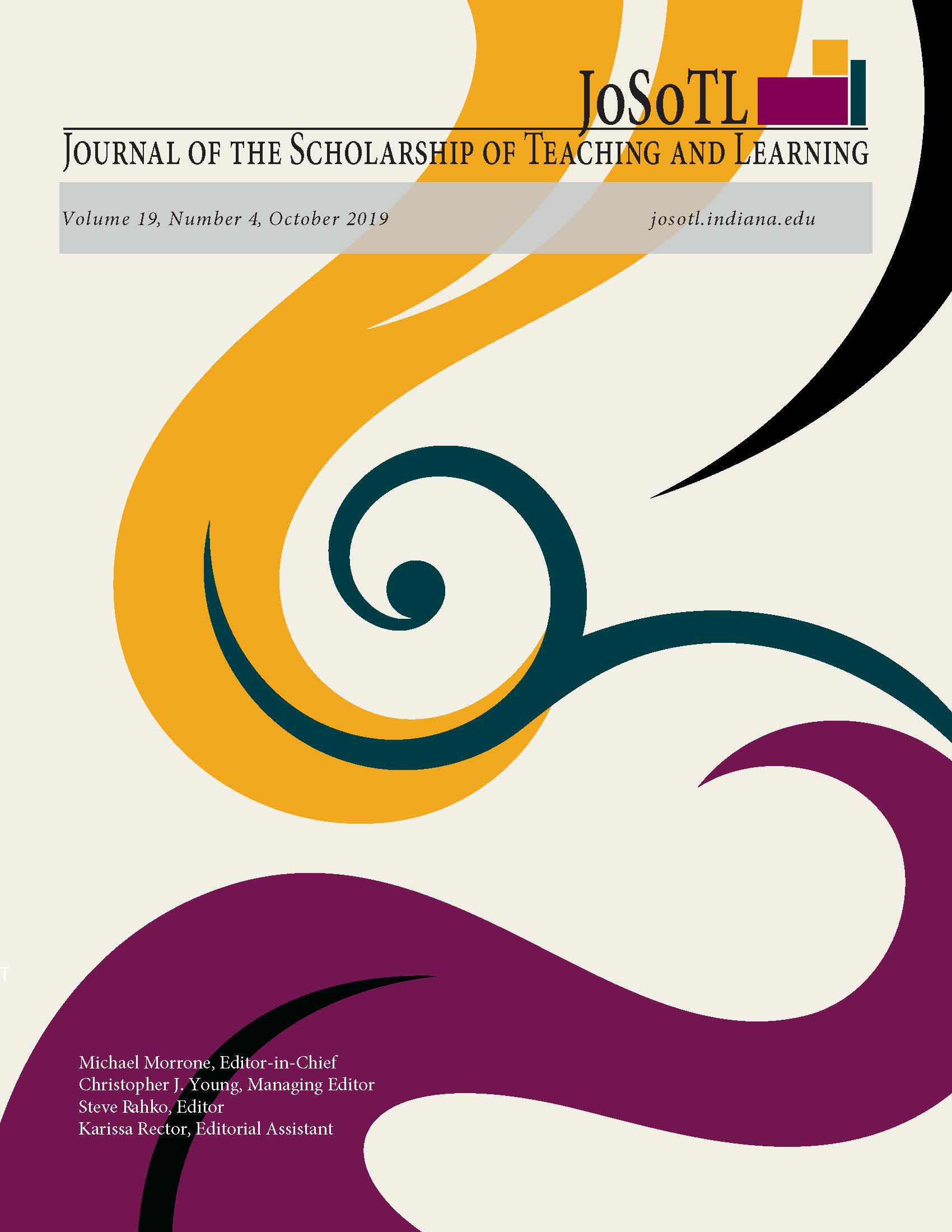A Case Study Using ProQuest RefWorks: An entry point for addressing information literacy.
Main Article Content
Abstract
An interdisciplinary team of university faculty members collaborated to develop an intervention to address a deficiency in student information literacy skills. The team developed video modules that instruct users how to create, use and maintain a ProQuest RefWorks account; a citation management software (CMS) tool that is compatible with Google Docs word processing. The research team collected YouTube and ProQuest RefWorks analytics as well as pre/post survey data from university students who participated in a pilot using the video modules. Results indicate that the modules impacted student information literacy skills; specifically, in-text citation and referencing. Based on the results, we also describe next steps for this research.
Downloads
Article Details
- Authors retain copyright and grant the Journal of the Scholarship of Teaching and Learning (JoSoTL) right of first publication with the work simultaneously licensed under a Creative Commons Attribution License, (CC-BY) 4.0 International, allowing others to share the work with proper acknowledgement and citation of the work's authorship and initial publication in the Journal of the Scholarship of Teaching and Learning.
- Authors are able to enter separate, additional contractual agreements for the non-exclusive distribution of the journal's published version of the work (e.g., post it to an institutional repository or publish it in a book), with an acknowledgement of its initial publication in the Journal of the Scholarship of Teaching and Learning.
- In pursuit of manuscripts of the highest quality, multiple opportunities for mentoring, and greater reach and citation of JoSoTL publications, JoSoTL encourages authors to share their drafts to seek feedback from relevant communities unless the manuscript is already under review or in the publication queue after being accepted. In other words, to be eligible for publication in JoSoTL, manuscripts should not be shared publicly (e.g., online), while under review (after being initially submitted, or after being revised and resubmitted for reconsideration), or upon notice of acceptance and before publication. Once published, authors are strongly encouraged to share the published version widely, with an acknowledgement of its initial publication in the Journal of the Scholarship of Teaching and Learning.
References
ACRL. (2000). Information literacy competency standards for higher education. Retrieved from http://www.ala.org/ala/mgrps/divs/acrl/standards/informationliteracycompetency.cfm#stan
ACRL. (2015). Framework for information literacy for higher education. Association of College and Research Libraries. Retrieved from http://www.ala.org/acrl/standards/ilframework
ACRL. (2015). Framework for information literacy for higher education appendices. Association of College and Research Libraries. Retrieved from http://www.ala.org/acrl/standards/ilframeworkapps
American Library Association. (2015). Framework for information literacy appendices. Retrieved from http://www.ala.org/acrl/standards/ilframeworkapps
Benda, C., Limpitlaw, A., & Estelle-Holmer, S. (2010). Battle of the bibliographic managers: EndNote vs. RefWorks vs. Zotero! American Theological Library Association Summary of Proceedings, 64, 81-87. Retrieved from https://ezproxy.chaminade.edu/login?url=http://search.ebscohost.com/login.aspx?direct=true&db=rfh&AN=ATLA0001823914&site=ehost-live
Butros, A., & Taylor, S. (2010). Managing information: Evaluating and selecting citation management software, A look at EndNote, RefWorks, Mendeley and Zotero. Netting Knowledge: Two Hemispheres/One World: Proceedings of the 36th IAMSLIC Annual Conference, 53-66.
Childress, D. (2011). Citation tools in academic libraries: Best practices for reference and instruction. Reference and User Services Quarterly, 51(2), 143-152.
Duong, K. (2010). Rolling out Zotero across campus as a part of a science librarian s outreach efforts. Science & Technology Libraries, 29(4), 315-324. Retrieved from http://dx.doi.org/10.1080/0194262X.2010.523309
Emanuel, J. (2013). Users and citation management tools: Use and support. Reference Services Review, 41(4), 639-659. https://www.emeraldinsight.com/doi/abs/10.1108/RSR-02-2013-0007
Fitzgerald, M. A. (2004). Making the leap from high school to college. Knowledge Quest, 32(4), 19-24.
Gilmour, R., & Cobus-Kuo, L. (2011). Reference management software: A comparative analysis of four products. Issues in Science and Technology Librarianship, (66) DOI: 10.5062/F4Z60KZF Retrieved from http://www.istl.org/11-summer/refereed2.html
Head, A. (2007). Beyond Google: How do students conduct academic research? First Monday, 12(8) doi:10.5210/fm.v12i8.1998
Head, A., Van Hoeck, M., & Garson, D. (2015). Lifelong learning in the digital age: A content analysis of recent research on participation. First Monday, 20(2) doi:10.5210/fm.v20i2.5857
Hull, D., Pettifer, S. R., & Kell, D. B. (2008). Defrosting the digital library: Bibliographic tools for the next generation web. PLoS Computational Biology, 4(10), e1000204. doi:10.1371/journal.pcbi.1000204
Jamieson, S. (2017). What the citation project tells us about information literacy in college composition. In B. J. D'Angelo, S. Jamieson, B. M. Maid & J. R. Walker (Eds.), Information literacy: Research and collaboration across disciplines (pp. 115-138). Fort Collins, CO: The WAC Clearinghouse.
Johnston, B., & Webber, S. (2003). Information literacy in higher education: A review and case study. Studies in Higher Education, 28(3), 335-352. doi:10.1080/03075070309295
Katz, I. R., & Elliot, N. (2017). Information literacy in digital environments: Construct mediation, construct modeling and validation processes. In B. J. D'Angelo, S. Jamieson, B. M. Maid & J. R. Walker (Eds.), Information literacy: Research and collaboration across disciplines (pp. 93-111). Fort Collins, CO: The WAC Clearinghouse.
Kuglitsch, R. Z., & Burge, P. (2016). Beyond the first year: Supporting sophomores through information literacy outreach. College & Undergraduate Libraries, 23(1), 79-92. doi:10.1080/10691316.2014.944636
McMinn, H. S. (2011). Library support of bibliographic management tools: A review. Reference Services Review, 39(2), 278-302. doi:10.1108/00907321111135493 ProQuest takes RefWorks to the next level with flow™. (2013). Retrieved from http://www.proquest.com/about/news/2013/ProQuest-Takes-RefWorks-to-the-NextLevel-with-Flow.html
ProQuest reimagines RefWorks platform to streamline the research and collaboration process. (June 20, 2016). PR Newswire (USA) Retrieved from http://infoweb.newsbank.com/resources/doc/print?p=AWNB
Saunders, L. (2007). Regional accreditation organizations’ treatment of information literacy: Definitions, collaboration, and assessment. Journal of Academic Librarianship, 33(3), 317-326.
Simboli, B., & Zhang, M. (2002). Citation management and citing-cited data. Issues in Science and Technology Librarianship, 35(2), 1-8.
Tramullas, J., Sánchez-Casabón, A. I., & Garrido-Picazo, P. (2015). Studies and analysis of reference management software: A literature review. El Profesional De La Información, 24(5), 680-688. doi:10.3145/epi.2015.sep.17
LSU Libraries. (March 13, 2018). Using Citation Management Software. Retrieved from https://guides.lib.lsu.edu/citation_management
Weiner, J. (2011). Is there a difference between critical thinking and information literacy? Journal of Information Literacy, 5(2), 81-92.
Wu, Y. D., & Kendall, S. L. (2006). Teaching faculty's perspectives on business information literacy. Reference Services Review, 34(1), 86-96. doi:10.1108/00907320610648789
